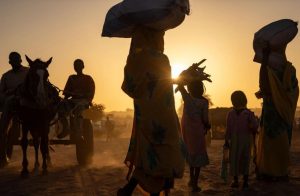Gender violence soaring in conflict zones
More than 60 million women and girls across the world who are forcibly displaced or stateless face high risks of gender-based violence”, according to the United Nations’ refugee agency UNHCR.
A new UNHCR report says “reports of conflict-related sexual violence increased shockingly by 50 percent last year compared to the previous year. Women and girls accounted for 95 percent of verified cases.”
Rape and sexual violence against women have historically been used as tools to inflict pain and to terrorise in times of war.
Most disturbingly, those numbers represent a small portion of reality, as many of the cases go unreported.
CARE data mentions that “since 2010, the Sexual Violence in Armed Conflict dataset reports 20 countries with massive levels of sexual violence in conflict. More than 257 million women were living in countries that had significant reports of sexual violence in conflict in 2021.”
Conflicts of the past and the damage they inflicted on women can tell us a lot about how current and future conflicts will affect women and girls.
While torture and killings of civilians have always been occurring during conflicts, there is a darker side to them that often goes unnoticed or is not often talked about.
Violence against women is much prevalent in war torn areas, recently in places such as Ukraine and Gaza, but historically, the world has seen many other instances of rape being used a tool to terrorise and permanently scar women.
In the past, wars such as the ones in Bosnia and Rwanda have included many instances of women reporting being raped or sexually assaulted.
In Rwanda, the number of women that were raped during the genocide in 1994 were between 250,000 to 500,000, according to The Conversation.
These are frightening numbers, as 70% of the population in Rwanda were female at the time.
The narrative around the genocide is often centred around the Hutus and Tutsis, two rival ethnic groups whose feud culminated into the atrocities of the 1994 genocide.
In this way, women’s voices are left unheard.
Women, as The Conversation reports, are asked not to testify as they can be deemed too emotional.
Those who do testify often have their stories fixed to align with the government’s views.
When it comes to women, omitting their voices not only ignores their contributions to aid those affected by the genocide, such as being rescuers, but it also portrays them as just victims of rape.
To this day, the International Criminal Tribunal for Rwanda has largely neglected investigating and prosecuting rapes. It has to date issued no indictments for rape and other forms of sexual violence, as Human Rights Watch reports.
There are more stories of conflict and genocide in which women have suffered immense trauma, but their voices are ignored, and perpetrators are not punished.
 This is reflected in other genocide stories like the one in Bosnia & Herzegovina in 1992.
This is reflected in other genocide stories like the one in Bosnia & Herzegovina in 1992.
Unlike the rape cases in Rwanda, the ones in Bosnia were prosecuted as a war crime before the International Criminal Tribunal for the former Yugoslavia, something which had never happened before, as Dr Olivera Simic reports.
Nevertheless, the narrative of women being simply helpless victims excludes the contributions of women in the war, such as being activists, peace builders and civil resistors.
On the other hand, most survivors do not often share their stories as they are afraid of the stigma and are ashamed of what has happened to them.
When Bosnian women talk about their experiences, they share stories of incredible resilience and courage in the face of evil.
Many women were only teenage girls at the time and managed to survive horrific events.
A lot of them speak of instances where they were driven to abandoned buildings and were repeatedly raped by Serbian soldiers.
They were forced to spend many nights in empty rooms with other girls, not knowing what would happen to them in the morning or having to stay up all night due to being repeatedly raped.
Unfortunately, not much has changed from then till now.
In places like Chad, Afghanistan and the Congo, women are abused daily, both in domestic situations, as well as in situations of war and conflict, where rape is used as a weapon to brutalise and take away women’s dignity, leaving them with permanent physical and mental scarring.
As reported by CARE, in places like Gaza, “already in 2021, 60% of people did not feel safe at home.”
The UNCHR mentions that humanitarian estimates are that 90 percent of women and girls moving along the Mediterranean route are raped.
The Strategist reports that UN Women estimates that, as of November 2023, the conflict between Israel and Hamas had resulted in 493,000 women and girls being displaced from their homes in Gaza.
A year later, this number will now be much greater as no ceasefire has been achieved.
Women’s rights are constantly attacked around the world and women-led organisations are bearing much backlash, as there is not enough funding available.
The UNCHR says that such thing is worrying as it does not believe that displaced women and girls will have access to critical services next year.
Such women-led organisations can have a direct impact on helping and improving traumatised women and girls and it is fundamental that they should be receiving more funding so they can continue their work.
There is still much improvement to be done in relation to the sexual violence inflicted upon women in times of war.
By Katerina Hatzi












